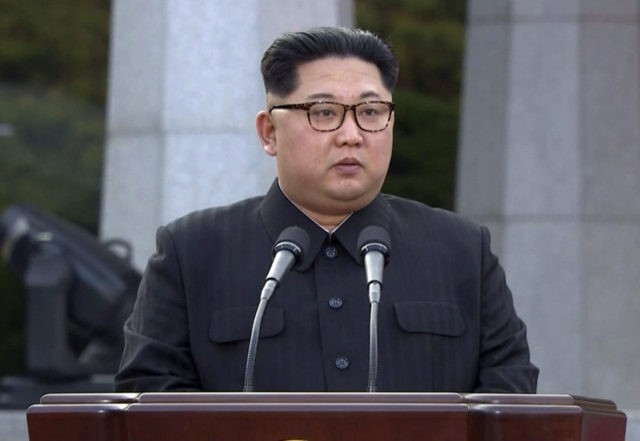A senior South Korean government official told reporters in Seoul on Wednesday that President Moon Jae-in believes that North Korean dictator Kim Jong-un “understands” denuclearizing his country would require international inspectors to receive access to the country’s nuclear test site.
“The North has said that it will close down the nuclear test site with international experts and reporters attending. I think this shows that Pyongyang has a strong will for (allowing) an inspection as well,” the unnamed official said, according to South Korean newswire service Yonhap. “It is nonsense to seek a nuclear-free Korean Peninsula without inspection and verification.”
South Korean officials are still helping media interpret the overarching message of a historic meeting last week between Moon and Kim in the border village of Panmunjom, which saw both leaders visit their respective countries for the first time (the village is divided between north and south, so both leaders hopped across the border symbolically). The leaders signed a statement called the “Panmunjom Declaration” vowing to end the Korean War, which is technically still occuring, and to denuclearize the Korean peninsula.
Many observers have questioned what Kim Jong-un means by “denuclearization,” as his regime has often called for the removal of U.S. assets from Korea placed there to protect South Korea from an imminent attack from the north. In remarks this weekend, Moon spokesman Yoon Young-chan stated that South Korea understood Kim to have promised to dismantle his illegal nuclear weapons program. According to Yoon, Kim told Moon that he would shut down the Punggye-ri Nuclear Test Site in May publicly.
According to Chosun Ilbo, Yoon stated that Kim would invite South Korean and American observers to the site. Moon, meanwhile, has requested United Nations aid in verifying the denuclearization of the site, which may trigger the transfer of responsibility from South Korean and American inspectors to international bodies.
The International Atomic Energy Agency (IAEA), the international agency that the UN would likely enable to inspect North Korea, is currently under fire for failing to inspect military sites in Iran following the signing of the 2015 Joint Comprehensive Plan of Action (JCPOA, or Iran nuclear deal). The IAEA insisted this week it had no evidence that Iran had violated the deal, contrary to revelations from the Israeli government that Iran had maintained a secret archive of nuclear weapons research in violation of the agreement. Yet as of last year, the IAEA had not requested any access to Iranian military sites for inspections to assure compliance with the JCPOA.
American officials have insisted on “unlimited access” to the nuclear sites following the drafting of an agreement to end the North Korean program. As Chosun notes, Washington is seeking the removal of all nuclear material from North Korea—not just the overtly weaponized material, but that sustaining the nation’s Yongbyon nuclear power plant.
Some reports have questioned whether such inspections are necessary given the state of the Punggye-ri site in North Korea. During the inter-Korean talks, Kim reportedly emphasized to Moon that the site is still operational.
“Some say that we are terminating facilities that are not functioning, but you will see that we have two more tunnels that are bigger than the existing ones and that they are in good condition,” Kim reportedly told Moon, according to Yoon.
Multiple studies using satellite image evidence and monitoring data independently concluded that Punggye-ri is largely inoperable after the nation’s sixth nuclear test in September. The site, located at the foot of Mount Mantap, has reportedly sustained heavy damage through tunneling to great a space for testing the bombs and the subsequent destruction after detonating what Pyongyang claimed to be a hydrogen bomb.
Scholars at the monitoring site 38 North contend that Punggye-ri can still serve as a nuclear test site. In a report published Monday, the site notes that “two mountainous areas accessible by the South and West Portals remain viable,” far from the heavy damage Mt. Mantap sustained to its north. “The data also corroborates Kim Jong-un’s publicly reported statement that two tunnels of the site remain in good condition,” it adds.
Kim Jong-un is currently planning to meet American President Donald Trump in either late May or early June to further plans for an end to the Korean War and denuclearization. American officials have promised updates soon on the time and place for this unprecedented summit.

COMMENTS
Please let us know if you're having issues with commenting.